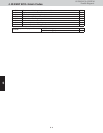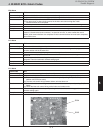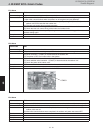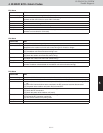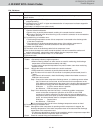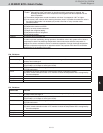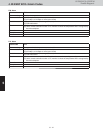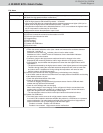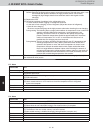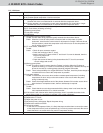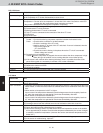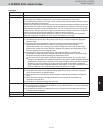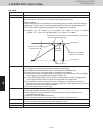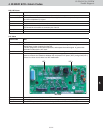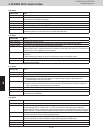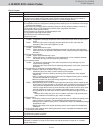
5
5 - 16
4. W-2WAY ECO-i Alarm Codes
W-2WAY ECO-i SYSTEM
Trouble Diagnosis
Correction (1) Replace the high-pressure sensor.
Caution: Because the high-pressure sensor connection employs a Schrader-type valve, it can
be removed and replaced. However, the high-pressure sensor can be easily
damaged by high voltage; therefore use sufficient caution with regard to static
electricity.
(2) Replace the PCB.
(3) Correct the locations of problems in the refrigeration cycle.
Correct locations where clogging or leakage has occurred.
In the case of over-charging, recover refrigerant. (Adjust the amount of refrigerant).
∗
Guide for over-charging
Be sure to connect the gauge to the high-pressure outlet when checking for over-charging.
During cooling: The following does not apply when outdoor air temperature is low or when fan
speed is controlled. When both compressor 1 and compressor 2 are
operating, and the fan mode is 14 (maximum fan speed), then the high
pressure saturation temperature should be approximately 30°F above the
outdoor air temperature. If it is 10°F or more above this level, then it is
possible that over-charging may have occurred.
During heating: There is an indoor unit where refrigerant flow is poor (E1 temperature and
discharge temperature are low), and the mechanical valve of that unit is
opened to 300 pulses or more, and the E1 temperature is close to room
temperature. However be aware that this kind of data results often when
there is a height difference between indoor units. Reducing the amount of
refrigerant will improve the refrigerant flow, however reducing it too much will
increase the likelihood of alarms related to low oil level (scroll-side), the low
pressure SW, and discharge temperature. Use caution.
•
•
Example This alarm may result when the service valve is closed or when valve leakage (particularly from
the mechanical valve) occurs.
F17 Alarm
Alarm code F17
Alarm meaning Low-pressure sensor trouble
Alarm conditions (1) Sensor short circuit
(2) Sensor open circuit
Probable cause (1) Sensor malfunction (including connector)
(2) PCB malfunction
Check (1) Measure the sensor resistance. Check that the sensor is operating normally.
(2) Use a remote monitor or a PC monitor to check the temperature that is recognized
by the microcomputer.
Correction —
Example —
Notes —
F31 Alarm
Alarm code F31
Alarm meaning Outdoor unit non-volatile memory (EEPROM) trouble
Alarm conditions (1) Non-volatile memory is not present when power initialization occurs.
(2) Read values do not match after writing to non-volatile memory is complete.
Probable cause (1) Memory was not inserted after the PCB was replaced.
(2) The lifetime of the non-volatile memory has been reached.
(3) Non-volatile memory is installed incorrectly (wrong direction, bent pins, etc.).
Check (1) Check the non-volatile memory on the PCB.
Correction —
Example —
Notes —



